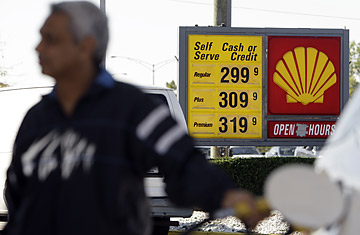
Gopesh Patel fills his SUV with gas in Troy, Mich., on Oct. 10
As the world braces for a recession whose depth and duration is anybody's guess, one silver lining of the downturn is already clear: the crisis at the gas pump is over. Just three months ago, oil prices hit $147 per bbl., pushing the price of gas in some parts of the U.S. to more than $5 per gal. But amid signs of a global economic slowdown, crude prices have cratered, and gas prices are following. Oil was trading at $78.63 per bbl. Tuesday, while the average price of a gallon of gasoline in the U.S. has fallen to $3.15 and will likely fall further in the coming weeks. That's because, along with falling global crude-oil prices, the refining capacity of the U.S.'s Gulf Coast that was lost as a result of Hurricanes Ike and Gustav is coming back onstream, which will mean a significant increase in gas supply next month.
In an economy now facing nothing but headwinds, declining oil prices may be about the only thing putting money directly back in consumers' pockets. After all, oil price increases and decreases have the same impact as tax hikes and cuts. According to Chris Lafakis, an economist at Moody's Economy.com, every $1 decline in the price of oil saves U.S. consumers $1 billion. The average oil price in the third quarter was $117; figure an average of about $80 for the current quarter, and that's about $40 billion in savings for the American consumer — the equivalent of one-third of the first stimulus package implemented by the government earlier this year. And it's likely that gas prices will fall further. Mary Novak, managing director of energy services for the economic consulting firm Global Insight, says every $10 decline in the price of crude oil adds two- to three-tenths of 1% to America's GDP, and her firm believes that crude will come down further.
That's the good news. The bad news is the reason for the price cut: the global economy is headed for a serious slump, which is already slashing demand for oil. Consumers all over the world had already begun cutting back on their consumption in response to the upward price shock. Now economic growth is slowing everywhere. The economies of the U.S. and Eurozone are expected to contract over the next couple of quarters — and possibly beyond. And demand for crude oil and refined products in the developing world, which has driven the price of oil to record levels in recent years, is now plummeting. An Economy.com survey of global business sentiment found record lows in confidence after last week's collapse in financial markets, not only in the U.S. and Europe, but also in Asia and South America. Global Insight's Novak notes that the last financial crisis, which ripped through Russia and southeast Asia a decade ago, cut global consumption by 1 million bbl. per day. Today, the world consumes about 88 milllion bbl. per day, and economists expect the current slowdown to cut consumption by a lot more than 1 million bbl. per day.
In the U.S., for example, 60% of gasoline consumption is associated with driving to work. As unemployment rises, "you're going to get a significant downturn in motor-fuel consumption," Novak says, and that will bring "continued huge [downward] pressure on oil prices."
The last time global oil prices collapsed on such a scale — in the early 1980s — they stayed down for almost a decade and a half. That's unlikely to happen this time. Oil demand in countries like China and India may be slowing down right now, but it's not going away, and economic growth in those countries will, over time, again drive sharp price increases. Gasoline consumption in China is certain to soar over the next 10 years. This year alone up to 25,000 new cars have hit the streets in China every day. And a global financial crisis and economic slump won't change the fact that nothing denotes middle-class status in China as much as ownership of an automobile, which, for the foreseeable future, will be gas-powered.
The U.S. consumes 25% of the world's crude, so for now, America's economic slump is the key factor driving down oil prices and giving consumers at least some relief in the midst of a harrowing economic storm. But in time, almost certainly, global oil demand will resume its rise. And prices will follow.
